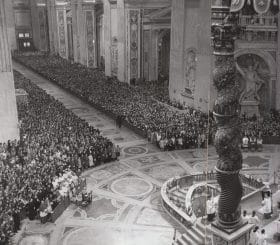
Nov 20, 2017 | Focolare Worldwide

Patrizia Mazzola
 y background was in the Scouts, so I couldn’t believe that I could take part in this new experience. The invitation was extended to many other students at my school, and finally, together with my sisters, we made up our minds to attend, even though I remember that at the last minute I was tempted to stay back as I had to undertake an exam. The others encouraged me to go and so we left Palermo on a number of buses. With me I took my inseparable guitar, songbooks and tape-recorder, which at that time was rather cumbersome. During the trip, I was favourably impressed by some of the girls, the Gen, who were already living the spirituality of unity. I was struck by their attitude, the attention they were giving to everyone, the climate of harmony and serenity that they created among us, despite our exuberance, the moments of reflection that followed when we listened to the songs of Gen Rosso and Gen Verde, which I learnt to play straightaway with great enthusiasm
y background was in the Scouts, so I couldn’t believe that I could take part in this new experience. The invitation was extended to many other students at my school, and finally, together with my sisters, we made up our minds to attend, even though I remember that at the last minute I was tempted to stay back as I had to undertake an exam. The others encouraged me to go and so we left Palermo on a number of buses. With me I took my inseparable guitar, songbooks and tape-recorder, which at that time was rather cumbersome. During the trip, I was favourably impressed by some of the girls, the Gen, who were already living the spirituality of unity. I was struck by their attitude, the attention they were giving to everyone, the climate of harmony and serenity that they created among us, despite our exuberance, the moments of reflection that followed when we listened to the songs of Gen Rosso and Gen Verde, which I learnt to play straightaway with great enthusiasm  It was March 1st, 1975. The Sports Palace in Rome which had gathered 20,000 young people from five continents, made a powerful impact on me. I immediately experienced the power of the Gospel when it is lived. For example, it was the first time that I found myself sharing deeply with someone who was sitting next to me, thus having the experience of living as brothers and sisters. My dream, to see a world of peace, a united world, came true, right there. I was amazed and awestruck by the personal testimonies so much so that I almost had to pinch myself to believe that all this was happening. I listened attentively as they shared their stories from the stage: the two young people from South Africa where apartheid had not yet been defeated, the group from Belfast where there was conflict due to religious and political division. They were tangible signs that, if we really commit ourselves, we can achieve peace there where we live.
It was March 1st, 1975. The Sports Palace in Rome which had gathered 20,000 young people from five continents, made a powerful impact on me. I immediately experienced the power of the Gospel when it is lived. For example, it was the first time that I found myself sharing deeply with someone who was sitting next to me, thus having the experience of living as brothers and sisters. My dream, to see a world of peace, a united world, came true, right there. I was amazed and awestruck by the personal testimonies so much so that I almost had to pinch myself to believe that all this was happening. I listened attentively as they shared their stories from the stage: the two young people from South Africa where apartheid had not yet been defeated, the group from Belfast where there was conflict due to religious and political division. They were tangible signs that, if we really commit ourselves, we can achieve peace there where we live.
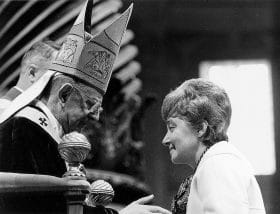 The next day, we all gathered at the Vatican, in St Peter’s Basilica, where Chiara Lubich presented us to the Holy Father. During the offertory, twelve young people, representing us, walked up with Chiara on the altar. I remember there was an endless applause. Consequently, during the Angelus (midday prayer) in St Peter’s Square, the Pope greeted us with words encouraging us to go on: “This morning, around the altar, we had twenty thousand faithful, the young Gen – New Generation – who came from all over the world. The beauty of it was something moving. We thank God and take courage. A new world is born: the Christian world of faith and charity.”
The next day, we all gathered at the Vatican, in St Peter’s Basilica, where Chiara Lubich presented us to the Holy Father. During the offertory, twelve young people, representing us, walked up with Chiara on the altar. I remember there was an endless applause. Consequently, during the Angelus (midday prayer) in St Peter’s Square, the Pope greeted us with words encouraging us to go on: “This morning, around the altar, we had twenty thousand faithful, the young Gen – New Generation – who came from all over the world. The beauty of it was something moving. We thank God and take courage. A new world is born: the Christian world of faith and charity.”
It was truly the beginning of a new world. For me it marked the beginning of a new life.
Patrizia Mazzola
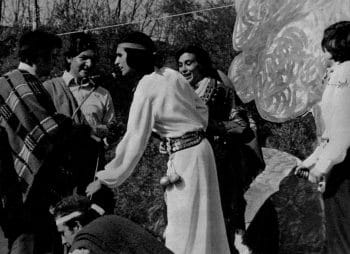
Oct 24, 2017 | Non categorizzato
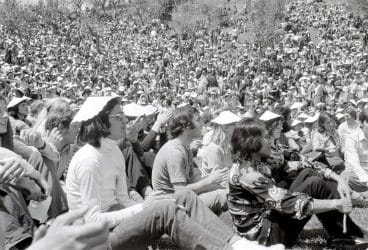 An unending line of buses filled with young people clamoured up the narrow roads that rose from Incisa Valdarno, Italy, to Loppiano. Such a long carcade hadn’t been expected and threatened to throw off the plans. Who would have expected 10,000 young people to come for what would then turn into a yearly event in many cities of the world? It was a real invasion that made all the jaws of Loppiano’s citizens drop. It began on a day of spring sunshine that burst from hearts and faces after a vigil of wind and rain: the first Genfest in history! And I was there! Yes, I was there! “Vivir para cantarlo,” García Márquez would say. “I live to sing it!” I can still see Loppiano’s natural amphitheatre in front of me, filled to the brim with young people from Italy and several other European countries, many hours of travel behind them – and also representatives from other countries around the world: like me from Argentina.
An unending line of buses filled with young people clamoured up the narrow roads that rose from Incisa Valdarno, Italy, to Loppiano. Such a long carcade hadn’t been expected and threatened to throw off the plans. Who would have expected 10,000 young people to come for what would then turn into a yearly event in many cities of the world? It was a real invasion that made all the jaws of Loppiano’s citizens drop. It began on a day of spring sunshine that burst from hearts and faces after a vigil of wind and rain: the first Genfest in history! And I was there! Yes, I was there! “Vivir para cantarlo,” García Márquez would say. “I live to sing it!” I can still see Loppiano’s natural amphitheatre in front of me, filled to the brim with young people from Italy and several other European countries, many hours of travel behind them – and also representatives from other countries around the world: like me from Argentina.
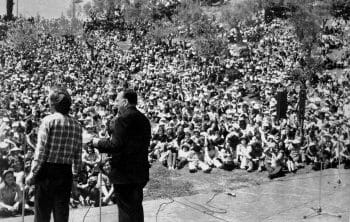
Fr Pasquale Foresi delivered a message from Pope Paul VI
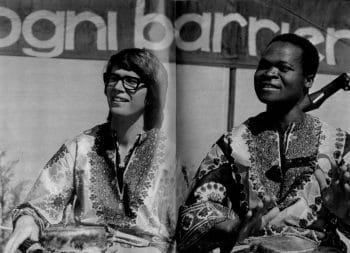
Participants from South Africa

The group from Argentina
Gustavo Clariá

Oct 5, 2017 | Non categorizzato
 After graduating in languages and international relations, I took off for Lebanon to continue my studies of the Arab language and, at long last, to immerge myself in Middle East culture that fascinated. It might seem odd to tell the story of an experience beginning from the end, from when I had to leave the Middle East, but that was when I grasped the importance experience. As I prepared to return to Italy, my thoughts went back to when it all began, and I asked myself if my long-awaited stay in the Middle East could already be over. I remembered myself as the girl who was taking her first steps into the choas of Beirut, who felt like everbody was staring at her because she was a foreigner. In a matter of a very little time, however, people began to stop me on the road and ask me in Arabic for directions, mistaking me for Lebanese. Perhaps it was more my prejudiced view towards them, rather than the opposite! In the beginning, the indifference towards the new environment was involuntary, which prevented me from getting out of myself and loving the people walking by. I hadn’t yet understood that the environment around me was just different, not dangerous.
After graduating in languages and international relations, I took off for Lebanon to continue my studies of the Arab language and, at long last, to immerge myself in Middle East culture that fascinated. It might seem odd to tell the story of an experience beginning from the end, from when I had to leave the Middle East, but that was when I grasped the importance experience. As I prepared to return to Italy, my thoughts went back to when it all began, and I asked myself if my long-awaited stay in the Middle East could already be over. I remembered myself as the girl who was taking her first steps into the choas of Beirut, who felt like everbody was staring at her because she was a foreigner. In a matter of a very little time, however, people began to stop me on the road and ask me in Arabic for directions, mistaking me for Lebanese. Perhaps it was more my prejudiced view towards them, rather than the opposite! In the beginning, the indifference towards the new environment was involuntary, which prevented me from getting out of myself and loving the people walking by. I hadn’t yet understood that the environment around me was just different, not dangerous.  I realized how much my vision of Lebanon changed over the course of the year. At first I had mostly perceived the differences with respect to Italy. Then, I quickly fell in love with the land, its richness, the variety of religions, cultures, scenic landscapes and history. I had fallen in love with the people who, in spite of their recent painful past, was able to live again, Christians and Muslims shoulder to shoulder. I had fallen in love with a people that was spontaneous, welcoming – and had a fantastic cuisine! Then I had to recuperate a bit of objectivity in looking at a land that like every other had its own contradictions, such as the great poverty and ostentatious wealth that live not far apart. In my mind I went back over the year in Lebanon during which many aspects of life that once seemed dangerous or odd, unfortunfortunate or disappointing compared to Italy, have become part of my daily life (not at all infelicitious – on the contrary!). When I said good-bye to the Sryian refugee children whom I had helped with homework, they only said “ciao,” showing how we’re all important and none of us is indispensible. Realizing that I’d probably never know what had come of them was rather painful. I had to say goodbye to the friends that I had made, to whom I owe so much and hoping with all my heart that I would see them again, but never really knowing if I would. It was quite an effort to embrace the thought that distances was coming between us once again, not only geographically, but mostly bureaucratically. To leave each other, knowing that borders, visas and distance were about to fall on us was, at times, exasperating and even unbearable. But now I know that this is the price you pay for being a global citizen as we Gen say. Now, after having left pieces of my heart around the world, a united world is no longer merely something that would be nice if it were really true: a world without borders has become a need.
I realized how much my vision of Lebanon changed over the course of the year. At first I had mostly perceived the differences with respect to Italy. Then, I quickly fell in love with the land, its richness, the variety of religions, cultures, scenic landscapes and history. I had fallen in love with the people who, in spite of their recent painful past, was able to live again, Christians and Muslims shoulder to shoulder. I had fallen in love with a people that was spontaneous, welcoming – and had a fantastic cuisine! Then I had to recuperate a bit of objectivity in looking at a land that like every other had its own contradictions, such as the great poverty and ostentatious wealth that live not far apart. In my mind I went back over the year in Lebanon during which many aspects of life that once seemed dangerous or odd, unfortunfortunate or disappointing compared to Italy, have become part of my daily life (not at all infelicitious – on the contrary!). When I said good-bye to the Sryian refugee children whom I had helped with homework, they only said “ciao,” showing how we’re all important and none of us is indispensible. Realizing that I’d probably never know what had come of them was rather painful. I had to say goodbye to the friends that I had made, to whom I owe so much and hoping with all my heart that I would see them again, but never really knowing if I would. It was quite an effort to embrace the thought that distances was coming between us once again, not only geographically, but mostly bureaucratically. To leave each other, knowing that borders, visas and distance were about to fall on us was, at times, exasperating and even unbearable. But now I know that this is the price you pay for being a global citizen as we Gen say. Now, after having left pieces of my heart around the world, a united world is no longer merely something that would be nice if it were really true: a world without borders has become a need.

Oct 4, 2017 | Non categorizzato
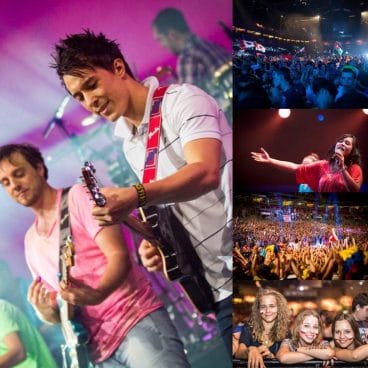 World Trade Centre Metro in Manila, Philippines, 6-8 July 2018. The meeting is for thousands of young people from all over the world, motivated by an idea, almost a fixation, which shapes their lives and all their social projects: building a just and united world. The Genfest 2018, Beyond all borders, is an invitation to let the barriers, borders, and limits which stand in the way of this goal, crumble. The Genfest began in 1973 with an idea from Chiara Lubich, founder of the Focolare Movement, and in more than 40 years it has gathered together tens of thousands of young people. The Genfest of 2018 will be the eleventh edition, and the first to be outside of Europe. In its long history, each Genfest has been an important step and has seen many projects come to life: among these is the idea for the World Youth Days, begun in 1985; in the same year, the birth of the Youth for a United World (YFUW); the World Unity Week, active since 1996, to showcase the initiatives which promote unity, at all levels, in the world; and finally, since 2012, the United World Project, a permanent observatory of all good practices on a planetary level. This Genfest will just precede the Synod on young people, which will be held in October 2018. Meeting with the organizers, present at this time at Castelgandolfo (Rome) for the meeting of the delegates of the Focolare Movement from all over the world, we have gathered some “first-hand” news. Ding Dalisay represents the Philippines at this assembly: “To our great joy, we have received the support of the president of the Catholic Bishops’ Conference of the Philippines, who encourages us to work to bring the Genfest to as many young people as possible. For some time now the youth of the Philippines have been touring in caravans to present the Genfest in parishes, universities, and other places. We have great hope that many young people will come.” Carlo Gentile, delegate of the Philippines along with Ding: “It will be the first Genfest in Asia, so it will be a very important multicultural event. Chiara Lubich called the Genfest a “cascade of God.” We can expect a wonderful event that has been prepared for all the youth from Asia, but also the whole world; a profound experience, immersed in the Asian culture.
World Trade Centre Metro in Manila, Philippines, 6-8 July 2018. The meeting is for thousands of young people from all over the world, motivated by an idea, almost a fixation, which shapes their lives and all their social projects: building a just and united world. The Genfest 2018, Beyond all borders, is an invitation to let the barriers, borders, and limits which stand in the way of this goal, crumble. The Genfest began in 1973 with an idea from Chiara Lubich, founder of the Focolare Movement, and in more than 40 years it has gathered together tens of thousands of young people. The Genfest of 2018 will be the eleventh edition, and the first to be outside of Europe. In its long history, each Genfest has been an important step and has seen many projects come to life: among these is the idea for the World Youth Days, begun in 1985; in the same year, the birth of the Youth for a United World (YFUW); the World Unity Week, active since 1996, to showcase the initiatives which promote unity, at all levels, in the world; and finally, since 2012, the United World Project, a permanent observatory of all good practices on a planetary level. This Genfest will just precede the Synod on young people, which will be held in October 2018. Meeting with the organizers, present at this time at Castelgandolfo (Rome) for the meeting of the delegates of the Focolare Movement from all over the world, we have gathered some “first-hand” news. Ding Dalisay represents the Philippines at this assembly: “To our great joy, we have received the support of the president of the Catholic Bishops’ Conference of the Philippines, who encourages us to work to bring the Genfest to as many young people as possible. For some time now the youth of the Philippines have been touring in caravans to present the Genfest in parishes, universities, and other places. We have great hope that many young people will come.” Carlo Gentile, delegate of the Philippines along with Ding: “It will be the first Genfest in Asia, so it will be a very important multicultural event. Chiara Lubich called the Genfest a “cascade of God.” We can expect a wonderful event that has been prepared for all the youth from Asia, but also the whole world; a profound experience, immersed in the Asian culture.  A worldwide mobilization has already begun. There are many contacts with other Movements, for example with the youth of the Rissho Kosei-kai, a Japanese Buddhist lay association, with six million followers, and with the Youth World Peace Forum, which will celebrate its own annual meeting in Manila during the same time period as the Genfest. In some parts of the world, smaller Genfest activities are being planned with local initiatives. A committee of 30 young people, representatives of different geographical areas of the world, with the coordination of the international secretariat of the Youth for a United World, is already at work. Kiara Cariaso and Diego Lopez explain: “We are working to bring young people from all over the world to the Genfest in Manila. There are already many activities, not only in the Philippines, because it will be a planetary event which we build together.” “In fact,” continues Diego, “we are gathering ideas that come from young people from all countries, we work together, and we send them to the Philippines.” They explain: “The 2018 Genfest will take place is three phases: the first, preceding the rally, with the possibility for many youth from various parts of the world to get to know the Asian cultures. It will be a unique intercultural, interreligious, and social experience, which will take place in different Asian countries. Following this, the central event in Manila, from 6 to 8 July, in which we want youth from every part of the world to be able to participate, so that each person’s situation will be made present, but at the same time each person will bring back to their own community their experience and the commitment they made in Manila. Finally, a “post Genfest,” especially for the Asian young people, which will allow them to testify to a “United Asia for a United World.” This will be a great experience for 800 young people in the Focolare small town of Tagaytay.” Offical site: y4uw.org/genfest
A worldwide mobilization has already begun. There are many contacts with other Movements, for example with the youth of the Rissho Kosei-kai, a Japanese Buddhist lay association, with six million followers, and with the Youth World Peace Forum, which will celebrate its own annual meeting in Manila during the same time period as the Genfest. In some parts of the world, smaller Genfest activities are being planned with local initiatives. A committee of 30 young people, representatives of different geographical areas of the world, with the coordination of the international secretariat of the Youth for a United World, is already at work. Kiara Cariaso and Diego Lopez explain: “We are working to bring young people from all over the world to the Genfest in Manila. There are already many activities, not only in the Philippines, because it will be a planetary event which we build together.” “In fact,” continues Diego, “we are gathering ideas that come from young people from all countries, we work together, and we send them to the Philippines.” They explain: “The 2018 Genfest will take place is three phases: the first, preceding the rally, with the possibility for many youth from various parts of the world to get to know the Asian cultures. It will be a unique intercultural, interreligious, and social experience, which will take place in different Asian countries. Following this, the central event in Manila, from 6 to 8 July, in which we want youth from every part of the world to be able to participate, so that each person’s situation will be made present, but at the same time each person will bring back to their own community their experience and the commitment they made in Manila. Finally, a “post Genfest,” especially for the Asian young people, which will allow them to testify to a “United Asia for a United World.” This will be a great experience for 800 young people in the Focolare small town of Tagaytay.” Offical site: y4uw.org/genfest

 y background was in the Scouts, so I couldn’t believe that I could take part in this new experience. The invitation was extended to many other students at my school, and finally, together with my sisters, we made up our minds to attend, even though I remember that at the last minute I was tempted to stay back as I had to undertake an exam. The others encouraged me to go and so we left Palermo on a number of buses. With me I took my inseparable guitar, songbooks and tape-recorder, which at that time was rather cumbersome. During the trip, I was favourably impressed by some of the girls, the Gen, who were already living the spirituality of unity. I was struck by their attitude, the attention they were giving to everyone, the climate of harmony and serenity that they created among us, despite our exuberance, the moments of reflection that followed when we listened to the songs of Gen Rosso and Gen Verde, which I learnt to play straightaway with great enthusiasm
y background was in the Scouts, so I couldn’t believe that I could take part in this new experience. The invitation was extended to many other students at my school, and finally, together with my sisters, we made up our minds to attend, even though I remember that at the last minute I was tempted to stay back as I had to undertake an exam. The others encouraged me to go and so we left Palermo on a number of buses. With me I took my inseparable guitar, songbooks and tape-recorder, which at that time was rather cumbersome. During the trip, I was favourably impressed by some of the girls, the Gen, who were already living the spirituality of unity. I was struck by their attitude, the attention they were giving to everyone, the climate of harmony and serenity that they created among us, despite our exuberance, the moments of reflection that followed when we listened to the songs of Gen Rosso and Gen Verde, which I learnt to play straightaway with great enthusiasm  It was March 1st, 1975. The Sports Palace in Rome which had gathered 20,000 young people from five continents, made a powerful impact on me. I immediately experienced the power of the Gospel when it is lived. For example, it was the first time that I found myself sharing deeply with someone who was sitting next to me, thus having the experience of living as brothers and sisters. My dream, to see a world of peace, a united world, came true, right there. I was amazed and awestruck by the personal testimonies so much so that I almost had to pinch myself to believe that all this was happening. I listened attentively as they shared their stories from the stage: the two young people from South Africa where apartheid had not yet been defeated, the group from Belfast where there was conflict due to religious and political division. They were tangible signs that, if we really commit ourselves, we can achieve peace there where we live.
It was March 1st, 1975. The Sports Palace in Rome which had gathered 20,000 young people from five continents, made a powerful impact on me. I immediately experienced the power of the Gospel when it is lived. For example, it was the first time that I found myself sharing deeply with someone who was sitting next to me, thus having the experience of living as brothers and sisters. My dream, to see a world of peace, a united world, came true, right there. I was amazed and awestruck by the personal testimonies so much so that I almost had to pinch myself to believe that all this was happening. I listened attentively as they shared their stories from the stage: the two young people from South Africa where apartheid had not yet been defeated, the group from Belfast where there was conflict due to religious and political division. They were tangible signs that, if we really commit ourselves, we can achieve peace there where we live.
 The next day, we all gathered at the Vatican, in St Peter’s Basilica, where Chiara Lubich presented us to the Holy Father. During the offertory, twelve young people, representing us, walked up with Chiara on the altar. I remember there was an endless applause. Consequently, during the Angelus (midday prayer) in St Peter’s Square, the Pope greeted us with words encouraging us to go on: “This morning, around the altar, we had twenty thousand faithful, the young Gen – New Generation – who came from all over the world. The beauty of it was something moving. We thank God and take courage. A new world is born: the Christian world of faith and charity.”
The next day, we all gathered at the Vatican, in St Peter’s Basilica, where Chiara Lubich presented us to the Holy Father. During the offertory, twelve young people, representing us, walked up with Chiara on the altar. I remember there was an endless applause. Consequently, during the Angelus (midday prayer) in St Peter’s Square, the Pope greeted us with words encouraging us to go on: “This morning, around the altar, we had twenty thousand faithful, the young Gen – New Generation – who came from all over the world. The beauty of it was something moving. We thank God and take courage. A new world is born: the Christian world of faith and charity.”








